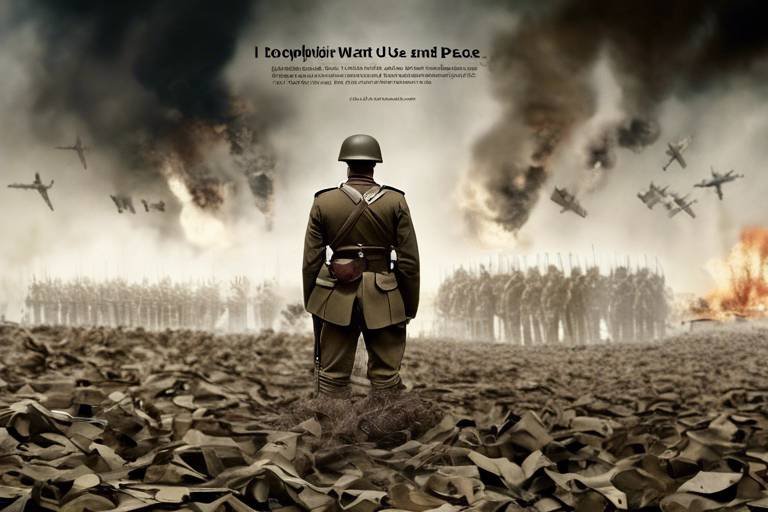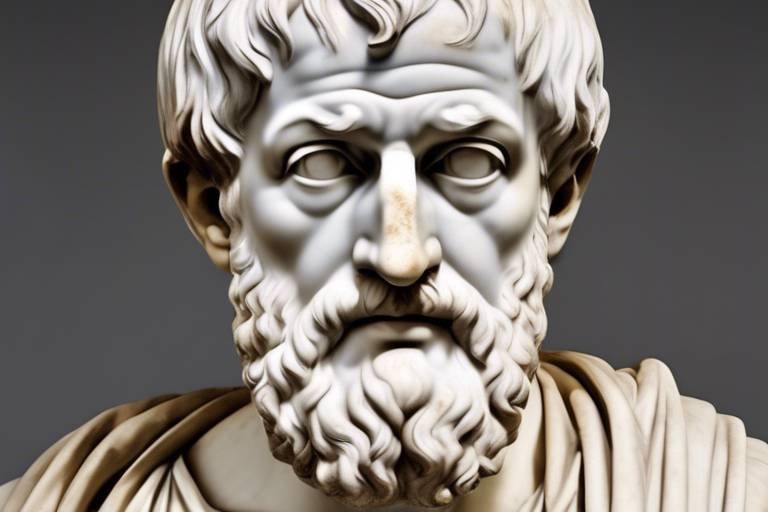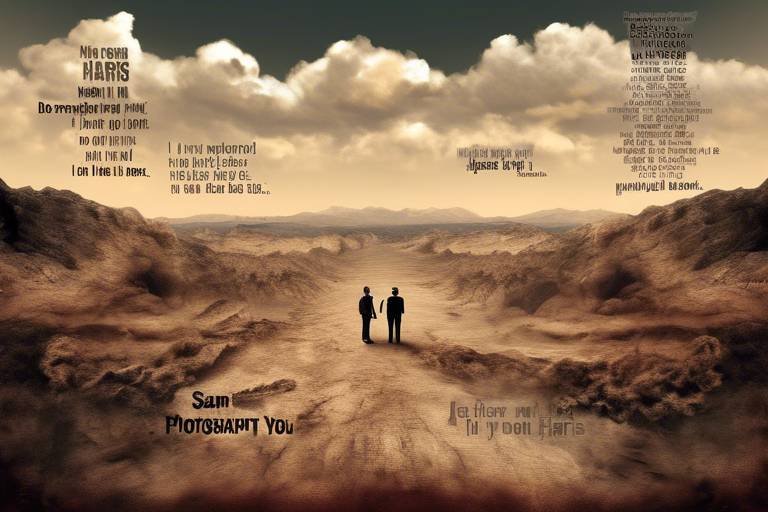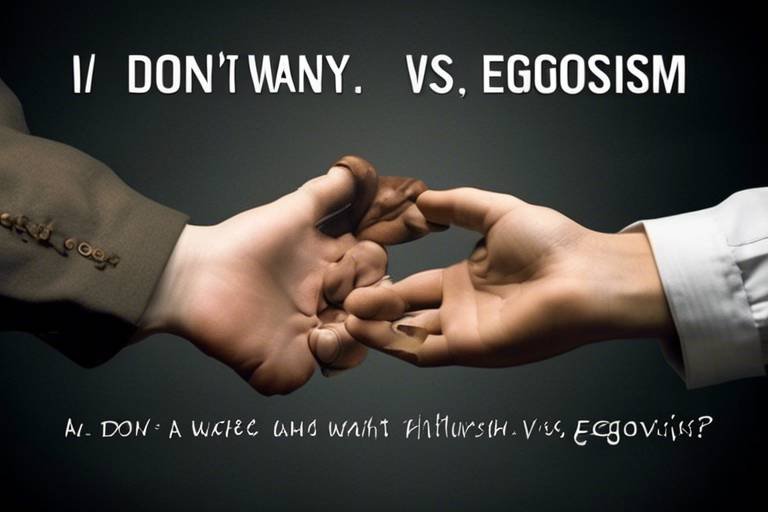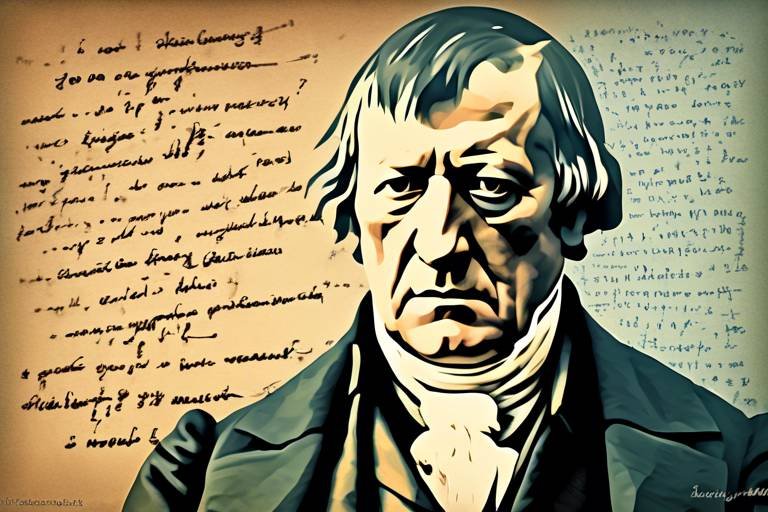The Philosophy of War and Peace
This article explores the complex interplay between war and peace, examining philosophical perspectives, ethical dilemmas, historical contexts, and the implications of conflict on society and human nature. The relationship between these two states is not merely a dichotomy; rather, it forms a dynamic continuum that reflects the intricacies of human existence. As we navigate through this exploration, we’ll uncover the underlying motivations that lead to conflict, the moral frameworks that attempt to justify warfare, and the philosophical aspirations that seek to cultivate enduring peace.
At its core, the philosophy of war and peace invites us to ponder the fundamental questions of existence: Why do humans engage in conflict? What justifies the act of war? And how can we foster a culture of peace in a world often marred by violence? These inquiries are not just academic; they resonate deeply within our collective conscience. The echoes of past wars linger in our memories, shaping our perspectives on current global affairs. As we delve into the philosophical dimensions of these themes, we will also reflect on the historical narratives that have influenced our understanding of conflict and resolution.
Through this journey, we will examine the moral justifications for war, including the principles of Just War Theory and utilitarian perspectives. We will also explore the philosophical theories of peace, analyzing the challenges that arise in the pursuit of a harmonious existence. By understanding the ethical dilemmas faced by societies during times of conflict, we can better appreciate the complexities involved in striving for peace.
As we embark on this exploration, let us remain open to the multitude of perspectives that define the philosophy of war and peace. It is through this lens that we can begin to grasp the profound implications of our choices and actions in shaping a world where both war and peace coexist, often in tension, yet always influencing the human experience.
Understanding the fundamental nature of conflict is essential. This section delves into the reasons behind human conflict and the philosophical underpinnings that drive individuals and nations to engage in war.
This section examines various philosophical theories that provide moral justifications for war, including just war theory and utilitarian perspectives, highlighting the ethical dilemmas faced by societies in times of conflict.
Just War Theory offers a framework for evaluating the morality of warfare. This subsection discusses its principles, including just cause, proportionality, and the importance of intention in justifying military action.
Exploring historical contexts helps illuminate how just war theory has been applied in various conflicts throughout history, examining case studies that illustrate moral reasoning in wartime decisions.
Critiques of Just War Theory question its applicability and moral soundness. This section discusses alternative views and challenges posed by pacifists and realists regarding the justification of war.
Utilitarianism evaluates the morality of actions based on their outcomes. This subsection explores how utilitarian principles can justify war, focusing on the greater good and the balance of harm versus benefit in conflict.
This section addresses the philosophical concepts surrounding peace, exploring how various thinkers have approached the idea of achieving lasting peace and the conditions necessary for its realization.
Different philosophical theories propose various pathways to peace. This subsection discusses pacifism, realism, and liberalism, examining their contributions to our understanding of peaceful coexistence.
Peacebuilding is fraught with challenges. This section highlights obstacles such as political power struggles, economic disparities, and social injustices that hinder the establishment of lasting peace in conflict-affected regions.
- What is the main argument of Just War Theory? Just War Theory argues that war can be morally justified under certain conditions, such as having a just cause, proportionality, and right intention.
- How do utilitarian perspectives justify war? Utilitarian perspectives justify war by evaluating the outcomes, suggesting that if the benefits outweigh the harms, military action can be deemed acceptable.
- What are the main obstacles to achieving peace? Major obstacles include political power struggles, economic inequalities, and social injustices, which complicate the peacebuilding process.

The Nature of Conflict
Understanding the fundamental nature of conflict is essential for grasping the intricate tapestry of human interactions. Conflict, at its core, is a natural phenomenon that arises from the clash of interests, values, or beliefs. Whether it manifests on a personal level—such as disputes between friends—or escalates into large-scale wars between nations, the underlying reasons often stem from a mix of psychological, sociological, and philosophical factors. Have you ever wondered why two neighbors might argue over a fence, while entire countries go to war over territory? The answer lies in the complex interplay of human emotions, desires, and the social constructs that shape our reality.
One of the most compelling aspects of conflict is its dual nature. On one hand, conflict can lead to destruction and suffering; on the other, it can serve as a catalyst for change and growth. The philosopher Hannah Arendt once suggested that conflict is a necessary component of human existence, as it challenges our beliefs and pushes societies toward progress. This perspective invites us to consider conflict not merely as a negative force but as a dynamic aspect of life that can lead to deeper understanding and transformation.
Moreover, the philosophical underpinnings of conflict reveal that it is often driven by deeply rooted human needs. According to the renowned psychologist Abraham Maslow, our basic needs—such as safety, belonging, and esteem—play a crucial role in shaping our actions. When these needs are threatened, individuals and groups may resort to conflict as a means of asserting their rights or defending their interests. This can create a cycle where fear and mistrust perpetuate further conflict, leading to a situation where peace seems unattainable.
To better understand the nature of conflict, we can categorize it into several types:
- Interpersonal Conflict: This occurs between individuals, often arising from misunderstandings or differing values.
- Intragroup Conflict: Conflicts that happen within a group, such as teams or organizations, often due to competition for resources or differing opinions.
- Intergroup Conflict: This involves disputes between different groups or communities, often fueled by competition or historical grievances.
- International Conflict: The most complex form, involving disputes between nations, often influenced by political, economic, or territorial interests.
Recognizing these types of conflict can help us understand their origins and the potential paths toward resolution. The philosophical inquiry into conflict also raises important questions about human nature. Are we inherently predisposed to conflict, or is it a learned behavior? This debate continues to engage thinkers across disciplines, from psychology to political science, and remains pivotal in exploring the depths of human interaction.
In conclusion, the nature of conflict is multifaceted and deeply embedded in the human experience. By examining the reasons behind conflicts and the philosophical perspectives that inform them, we can begin to unravel the complexities of war and peace. Understanding these dynamics is crucial not only for preventing conflict but also for fostering a more harmonious society where dialogue and understanding can replace violence and discord.
- What are the main causes of conflict? Conflict can arise from a variety of factors including competing interests, misunderstandings, and differing values or beliefs.
- Can conflict ever be positive? Yes, conflict can sometimes lead to growth and change, prompting individuals and societies to reevaluate their beliefs and practices.
- How can we resolve conflicts effectively? Effective conflict resolution often involves open communication, empathy, and a willingness to understand the other party's perspective.

Moral Justifications for War
War has been a part of human history for as long as we can remember, but the question of whether it can ever be justified is a complex one. Philosophers and ethicists have grappled with this dilemma, leading to various theories that attempt to provide moral justifications for engaging in conflict. These theories not only reflect the ethical considerations of their time but also serve as a guide for societies facing the harsh realities of war. Among the most prominent frameworks are Just War Theory and Utilitarian Perspectives, both of which offer unique insights into the moral quandaries of warfare.
At its core, Just War Theory posits that war can only be justified under certain conditions. This theory emphasizes the importance of having a just cause, where the reasons for going to war must be morally sound. For instance, one might argue that defending one's country against an aggressor is a just cause, while waging war for conquest is not. Additionally, proportionality is a key principle, suggesting that the violence used in the war must be proportional to the injury suffered. This means that if a nation is attacked, its response should not result in more harm than the initial aggression. Lastly, the intention behind the war must be to restore peace and justice, rather than to achieve selfish gains.
Throughout history, various conflicts have tested the principles of Just War Theory. For example, during World War II, the Allied forces justified their military actions against Nazi Germany based on the need to stop atrocities and restore global peace. This case illustrates how moral reasoning can guide nations in making difficult decisions during wartime. However, the application of Just War Theory is not without its challenges. Critics argue that the subjective nature of what constitutes a "just cause" can lead to manipulation and misuse, allowing nations to justify wars that may not be ethically sound.
Critics of Just War Theory often come from two main perspectives: pacifism and realism. Pacifists argue that war is inherently immoral and that conflicts should be resolved through nonviolent means. They believe that the loss of life and suffering caused by war can never be justified, regardless of the circumstances. On the other hand, realists contend that moral considerations are secondary to the pursuit of national interests. They argue that in the anarchic international system, states must sometimes resort to war to secure their survival, regardless of ethical implications.
Utilitarianism offers another lens through which to evaluate the morality of war. This philosophical approach assesses the rightness or wrongness of actions based on their outcomes. In the context of war, utilitarianism suggests that a conflict may be justified if it leads to the greatest good for the greatest number of people. For instance, a war that ends a tyrannical regime may be seen as morally justified if it results in a more stable and prosperous society. However, this perspective also raises ethical dilemmas, particularly in weighing the immediate harms of war against the potential long-term benefits. The challenge lies in accurately predicting the consequences of war and determining whose interests are prioritized.
In summary, the moral justifications for war are deeply rooted in philosophical inquiry and historical context. While Just War Theory provides a structured approach to evaluating the ethics of warfare, critiques from pacifists and realists remind us that the morality of war is often a contentious and complex issue. Similarly, utilitarian perspectives challenge us to consider the broader implications of conflict, urging us to weigh the potential benefits against the inevitable costs. As we navigate the turbulent waters of human conflict, these moral frameworks serve as critical tools for understanding the ethics of war and peace.
- What is Just War Theory? - Just War Theory is a philosophical framework that outlines the conditions under which war can be morally justified.
- Are there any criticisms of Just War Theory? - Yes, critics argue that it can be misused to justify unjust wars and that it often fails to account for the complexities of real-world conflicts.
- What is the utilitarian perspective on war? - Utilitarianism evaluates the morality of war based on its outcomes, suggesting that war may be justified if it leads to the greatest good for the greatest number.
- Can war ever be justified? - This is a complex question and varies based on individual beliefs, ethical frameworks, and the specific circumstances surrounding a conflict.

Just War Theory
Just War Theory is a philosophical framework that seeks to provide a moral basis for engaging in warfare. This theory is not just a set of rules; it’s a profound exploration of the ethical complexities surrounding the decision to go to war. At its core, Just War Theory is built on several key principles that help determine whether a war can be considered justifiable. These principles include just cause, proportionality, and the importance of intention. Each of these elements plays a critical role in assessing the morality of military actions.
The principle of just cause asserts that a war is only justified if it is fought for reasons that are morally sound. This could involve self-defense against aggression or the protection of innocent lives. For example, if a nation is attacked, it has a right to defend itself. However, the challenge lies in defining what constitutes a 'just cause.' Is it enough to claim that a war is for liberation, or must there be a concrete threat to justify military intervention?
Proportionality is another crucial aspect of Just War Theory. It dictates that the violence used in the war must be proportional to the injury suffered. This means that the benefits gained from waging war should outweigh the harm inflicted. For instance, if a country decides to invade another nation to prevent a minor threat, the resulting destruction and loss of life may not be justified. Here, one might ponder: does the end truly justify the means? This question often leads to heated debates among philosophers, ethicists, and policymakers alike.
Moreover, the importance of intention cannot be overlooked. Just War Theory posits that the motives behind waging war are just as significant as the actions taken during the conflict. A nation may have a just cause, but if its intentions are rooted in self-interest or imperialism, the morality of the war is called into question. This brings us to the heart of ethical dilemmas faced by societies in times of conflict. Are we fighting for freedom, or are we merely masking our ambitions under the guise of righteousness?
To better understand how Just War Theory has been applied throughout history, we can look at various case studies. For instance, the NATO intervention in Kosovo in 1999 is often cited as a modern example of Just War Theory in action. The intervention was justified on humanitarian grounds, aiming to prevent ethnic cleansing. However, critics argue that the actual outcomes and the motivations behind the intervention were more complex than initially presented.
| Principle | Description |
|---|---|
| Just Cause | A valid reason for going to war, such as self-defense or protection of innocents. |
| Proportionality | The violence used must be proportional to the injury suffered; benefits must outweigh harms. |
| Importance of Intention | The motives behind the war must be morally sound, not driven by self-interest. |
Despite its foundational role in discussions of war ethics, Just War Theory has faced significant critiques. Many argue that its principles can be manipulated to justify almost any military action, leading to a slippery slope where wars can be waged under dubious pretenses. Furthermore, pacifists challenge the very notion of war, advocating for nonviolent solutions to conflict. They argue that even a 'just' war ultimately leads to suffering and destruction, and thus, should be avoided at all costs.
In conclusion, Just War Theory provides a critical lens through which we can examine the morality of warfare. It forces us to confront tough questions about our motivations, the consequences of our actions, and the ethical implications of conflict. As we navigate the complexities of war and peace, understanding these principles can pave the way for more thoughtful and responsible decision-making in international relations.
- What is Just War Theory? Just War Theory is a philosophical framework that evaluates the morality of engaging in warfare based on principles like just cause, proportionality, and intention.
- What are the main principles of Just War Theory? The main principles include just cause, proportionality, and the importance of intention behind military actions.
- Can Just War Theory be applied to modern conflicts? Yes, Just War Theory can be applied to modern conflicts, although its principles are often debated and interpreted in various ways.
- What are the critiques of Just War Theory? Critics argue that Just War Theory can be manipulated to justify wars and that it does not adequately address the moral implications of war itself.

Historical Contexts
When we delve into the of just war theory, we uncover a rich tapestry of human experience that shapes our understanding of morality in warfare. Throughout history, societies have grappled with the ethical implications of conflict, often invoking philosophical frameworks to justify their actions. For instance, during the Roman Empire, leaders like Cicero articulated principles of just war that emphasized the importance of a just cause and the necessity of proportionality. They believed that wars fought for noble reasons, such as self-defense or the protection of the innocent, could be deemed morally permissible.
One of the most significant examples of just war theory in practice can be seen in the American Civil War. The Union's fight against the Confederacy was framed not only as a struggle for the preservation of the nation but also as a moral imperative to end slavery. This conflict raised profound questions about the nature of justice, as leaders like Abraham Lincoln invoked the principles of just war to justify their military actions. The war's legacy continues to spark debates about the morality of war and the ethical responsibilities of nations in times of conflict.
Another pivotal moment in history is World War II, where the Allied powers, facing the atrocities of Nazi Germany, found themselves at a moral crossroads. The principles of just war theory were invoked to justify military actions aimed at stopping a regime that was committing genocide. The concept of humanitarian intervention emerged, suggesting that sometimes, waging war is necessary to prevent greater evils. This raises a critical question: can the ends ever truly justify the means?
However, the application of just war theory has not been without its challenges. Critics argue that historical justifications have often been manipulated to serve political agendas. For instance, in the context of the Vietnam War, the U.S. government claimed to be fighting for freedom and democracy, yet many questioned whether the war's objectives aligned with the moral principles outlined in just war theory. This highlights a crucial tension: the disparity between philosophical ideals and the messy reality of human conflict.
To better understand these historical contexts, we can look at a comparison of significant wars and the justifications used at the time. The table below illustrates some key conflicts and their moral reasoning:
| Conflict | Justification | Key Figures |
|---|---|---|
| American Civil War | Preservation of the Union and abolition of slavery | Abraham Lincoln, Frederick Douglass |
| World War II | Stopping fascism and genocide | Franklin D. Roosevelt, Winston Churchill |
| Vietnam War | Containment of communism and promotion of democracy | Lyndon B. Johnson, Richard Nixon |
In conclusion, the historical contexts of just war theory reveal a complex interplay between ethical reasoning and the harsh realities of conflict. As we reflect on these examples, we are reminded that the moral landscape of war is often murky, filled with competing narratives and justifications. Understanding these contexts not only enriches our comprehension of past conflicts but also equips us to engage with contemporary issues surrounding war and peace.

Critiques of Just War Theory
The Just War Theory has long served as a framework for assessing the morality of warfare, but it is not without its critics. Many philosophers, ethicists, and political theorists have raised significant concerns regarding its applicability and moral soundness. One of the primary critiques is that the theory is often too abstract, failing to account for the chaotic and unpredictable nature of war. Critics argue that the principles of Just War Theory, such as just cause and proportionality, may be interpreted differently depending on the context, leading to moral relativism where the justifications for war can be manipulated to fit any narrative.
Moreover, some pacifists argue that any form of war is inherently unjust, emphasizing that the loss of life and suffering caused by conflict can never be justified, regardless of the intentions behind it. They question whether a truly just cause can ever exist, suggesting that the very act of war contradicts the pursuit of peace and humanity. This perspective challenges the foundational belief that war can be morally justified under any circumstances.
Additionally, realists critique Just War Theory for being overly idealistic. They contend that moral considerations are often sidelined in favor of political expediency. In their view, nations act primarily in their self-interest, and moral arguments are frequently used as a facade to justify aggressive actions. This raises an important question: can a theory rooted in morality truly guide the actions of states that prioritize power and survival above ethical considerations?
Another significant critique comes from the historical context in which Just War Theory has been applied. Many conflicts that have been framed as 'just wars' often reveal a complex interplay of political motives, economic interests, and social dynamics that complicate the moral narrative. For instance, wars that were initially justified on humanitarian grounds have sometimes led to unintended consequences, such as prolonged violence and instability, undermining the very principles that Just War Theory seeks to uphold.
To illustrate these critiques further, consider the following table that summarizes the main objections to Just War Theory:
| Critique | Description |
|---|---|
| Abstract Principles | The theory's principles can be interpreted in various ways, leading to moral relativism. |
| Pacifist Opposition | Any war is unjust; the loss of life cannot be morally justified. |
| Realist Perspective | Moral arguments are often secondary to political interests in wartime. |
| Historical Misapplication | Many 'just wars' reveal complex motives that undermine the theory's integrity. |
In conclusion, while Just War Theory provides a valuable framework for discussing the morality of war, its critiques highlight the complexities and challenges inherent in applying ethical principles to real-world conflicts. The ongoing debate surrounding these critiques encourages a deeper examination of the ethical dimensions of warfare and invites us to consider alternative approaches to conflict resolution.
- What is Just War Theory? Just War Theory is a philosophical framework that seeks to determine the moral justification for engaging in war.
- What are the main principles of Just War Theory? The main principles include just cause, proportionality, and the importance of intention behind military actions.
- Why do some philosophers criticize Just War Theory? Critics argue that it is too abstract, can be manipulated for political purposes, and fails to account for the realities of war.
- What alternatives exist to Just War Theory? Alternatives include pacifism, which opposes all forms of war, and realism, which focuses on the political realities rather than moral considerations.

Utilitarian Perspectives
When we talk about war, it’s hard not to think about the heavy toll it takes on human life and society. But what if we looked at war through a different lens? Enter utilitarianism, a philosophical theory that weighs the morality of actions based on their outcomes. In essence, utilitarianism argues that the right action is the one that produces the greatest good for the greatest number. This perspective can provide a compelling, albeit controversial, justification for engaging in warfare.
Utilitarianism comes with its own set of principles that can be applied to the context of war. Imagine a scenario where a nation is faced with an aggressive adversary threatening its citizens. The utilitarian perspective would prompt leaders to consider whether engaging in war would ultimately lead to a net positive outcome for their population. It’s about weighing the potential benefits against the inevitable harms. Here are some key considerations:
- Greater Good: Does the war aim to protect a larger population or prevent greater suffering?
- Balance of Harm: Are the anticipated casualties justified by the potential for peace or security?
- Long-term Outcomes: Will the aftermath of the conflict lead to a more stable and just society?
One of the most poignant examples of utilitarianism in action is the decision-making process during World War II. Leaders faced with the choice of whether to use atomic bombs on Japan had to weigh the immediate devastation against the potential for saving countless lives that might be lost in a prolonged war. While the bombings resulted in significant loss of life, proponents argue that they ultimately hastened the end of the war, thereby preventing even greater casualties on both sides. This is a classic case of the utilitarian dilemma: how do you measure the value of one life against many?
However, just like any philosophical approach, utilitarianism is not without its criticisms. Critics argue that it can lead to morally questionable decisions, where the ends justify the means, potentially sacrificing individual rights for the sake of the majority. This raises ethical dilemmas: is it acceptable to harm a smaller group if it benefits a larger one? Moreover, the unpredictable nature of war complicates the utilitarian calculus. Outcomes are rarely clear-cut, and the actual consequences of conflict can diverge significantly from the anticipated benefits.
Utilitarian perspectives also invite us to consider the long-term implications of war. While a conflict may seem justified in the short term, the long-term effects can be devastating. Nations may find themselves entrenched in cycles of violence, leading to further suffering and instability. This is where the debate becomes particularly heated: can utilitarianism truly justify war when the aftermath can lead to a greater humanitarian crisis?
In conclusion, while utilitarianism offers a framework for justifying war based on outcomes, it also opens up a Pandora’s box of ethical questions. It forces us to confront the complexities of human life and the moral weight of our decisions. As we navigate the murky waters of conflict and peace, understanding these perspectives can help us make more informed choices about the path we take. After all, in the grand scheme of things, the goal should always be to minimize suffering and promote well-being for all.
- What is utilitarianism? Utilitarianism is a philosophical theory that suggests the best action is the one that maximizes overall happiness or utility.
- How does utilitarianism apply to war? Utilitarianism evaluates the morality of war based on the outcomes it produces, weighing the benefits against the harms.
- Are there criticisms of utilitarian perspectives on war? Yes, critics argue that utilitarianism can justify morally questionable actions and may overlook individual rights in favor of the majority.
- Can utilitarianism lead to better decision-making in wartime? It can provide a framework for evaluating potential outcomes, but it also complicates moral decisions due to the unpredictable nature of war.

The Pursuit of Peace
In a world often overshadowed by conflict, the pursuit of peace stands as a beacon of hope and aspiration. Philosophers, leaders, and thinkers have long grappled with the question: what does it truly mean to achieve lasting peace? To dive into this profound inquiry, we must explore various philosophical perspectives that illuminate the pathways to peace, as well as the conditions necessary for its realization.
At the heart of this exploration lies the recognition that peace is not merely the absence of war; it is a dynamic state of harmony that encompasses social, political, and economic dimensions. Thinkers like Immanuel Kant proposed that lasting peace can be achieved through the establishment of a "perpetual peace," where nations engage in cooperative relationships and uphold democratic principles. Kant believed that the rule of law and mutual respect among states could pave the way for a more peaceful world.
However, the journey towards peace is fraught with challenges. Political power struggles often act as significant roadblocks. In many regions, the quest for power can lead to conflict, undermining efforts to build a peaceful society. Additionally, economic disparities create tensions that can escalate into violence. For instance, when wealth is concentrated in the hands of a few while the majority struggles to meet basic needs, resentment brews, making peace a distant dream.
Social injustices also play a critical role in hindering peace. Discrimination based on race, gender, or socioeconomic status can create deep divides within societies. To achieve true peace, these inequalities must be addressed. As Martin Luther King Jr. famously stated, "Injustice anywhere is a threat to justice everywhere." This highlights the interconnectedness of social justice and peace, suggesting that efforts to build a peaceful society must also prioritize equity and inclusion.
Furthermore, various philosophical theories offer unique insights into the pursuit of peace. Pacifism advocates for non-violence as a means to resolve conflicts, emphasizing dialogue and understanding over aggression. On the other hand, realism posits that nations act primarily in their self-interest, often leading to a more cynical view of international relations. Meanwhile, liberalism suggests that cooperation and international institutions can foster peace by promoting interdependence among nations.
Despite these theoretical frameworks, the practical application of peacebuilding remains complex. It requires a multifaceted approach that considers the unique cultural, historical, and social contexts of each conflict-affected region. Peacebuilding initiatives must be tailored to address the specific needs and grievances of communities, ensuring that local voices are heard and included in the process.
In conclusion, the pursuit of peace is an intricate journey that demands a deep understanding of the underlying causes of conflict and a commitment to addressing the conditions that foster harmony. By recognizing the significance of social justice, economic equity, and political cooperation, we can move closer to realizing a world where peace is not just an ideal but a lived reality for all.
- What is the main goal of peacebuilding? The main goal of peacebuilding is to create sustainable conditions for peace by addressing the root causes of conflict, promoting social justice, and fostering cooperation among communities.
- How can individuals contribute to the pursuit of peace? Individuals can contribute by advocating for social justice, participating in community dialogue, and supporting organizations that work towards conflict resolution and peacebuilding.
- What role does education play in achieving peace? Education plays a crucial role by fostering critical thinking, promoting empathy, and encouraging understanding among diverse groups, which can help prevent conflicts from arising.

Philosophical Theories of Peace
The quest for peace has been a central theme in philosophy for centuries, with various thinkers proposing diverse theories to understand and achieve it. At its core, the philosophy of peace examines the conditions necessary for harmonious coexistence among individuals and nations. Theories of peace can be broadly categorized into three major schools of thought: pacifism, realism, and liberalism. Each of these perspectives offers unique insights and approaches to the concept of peace, reflecting the complexities of human nature and societal structures.
Pacifism posits that violence is inherently wrong and that conflicts should be resolved through nonviolent means. This belief is deeply rooted in ethical considerations, advocating for the sanctity of life and the moral imperative to seek peaceful resolutions. Prominent pacifist thinkers, such as Mahatma Gandhi and Martin Luther King Jr., emphasized the power of nonviolent resistance, demonstrating that peaceful protest can lead to significant social change. Their philosophies suggest that true peace is not merely the absence of war but the presence of justice and equality.
On the other hand, realism presents a more pragmatic view of peace. Realists argue that the international arena is characterized by competition and conflict, where states act primarily in their own self-interest. According to this perspective, peace is often a temporary state achieved through balance of power rather than moral considerations. Realists like Thomas Hobbes have famously described the "state of nature" as a war of all against all, suggesting that without a strong governing authority, violence is inevitable. Thus, for realists, maintaining peace requires a robust military presence and strategic alliances, often at the expense of ethical considerations.
In contrast, liberalism offers a more optimistic view of peace, emphasizing the role of international institutions, democracy, and economic interdependence in fostering peaceful relations. Liberal theorists argue that democracies are less likely to go to war with one another, a concept known as the Democratic Peace Theory. This theory posits that shared democratic values and economic ties create mutual interests that discourage conflict. Furthermore, organizations like the United Nations embody liberal ideals by promoting dialogue and cooperation among nations, aiming to resolve disputes through diplomacy rather than warfare.
These philosophical theories of peace are not mutually exclusive; rather, they intersect and interact in complex ways. For instance, while pacifism advocates for nonviolent solutions, it can be complemented by liberal approaches that promote dialogue and cooperation. Similarly, elements of realism can inform pacifist strategies by acknowledging the need for security in a world often fraught with conflict. Understanding these theories equips us with a broader perspective on the challenges of achieving peace in our world today.
Ultimately, the pursuit of peace is a multifaceted endeavor, requiring a deep understanding of human motivations, societal structures, and the ethical implications of our choices. As we navigate the turbulent waters of conflict and cooperation, these philosophical theories serve as guiding lights, illuminating the pathways toward a more peaceful future.
- What is pacifism? Pacifism is the belief that violence is unjustifiable and that conflicts should be resolved through peaceful means.
- How does realism differ from liberalism? Realism focuses on the competitive nature of international relations, while liberalism emphasizes cooperation, democracy, and international institutions as pathways to peace.
- Can these theories coexist? Yes, elements from different theories can intersect and inform one another, creating a more nuanced understanding of peace.

Challenges to Peacebuilding
The journey to achieving lasting peace is often obstructed by a myriad of challenges that can feel as daunting as climbing a mountain without the right gear. One of the most significant obstacles is the presence of political power struggles. In many conflict-affected regions, political factions vie for control, often prioritizing their interests over the broader goal of peace. This struggle for power can lead to a vicious cycle of violence, where temporary ceasefires are frequently broken, and trust between opposing parties is eroded. The question arises: how can genuine peace be established when the very leaders who should be promoting it are often the ones perpetuating conflict?
Another critical challenge lies in economic disparities. In societies where wealth is concentrated in the hands of a few, the majority may feel marginalized and disenfranchised. This economic inequality breeds resentment and can lead to social unrest, making peacebuilding efforts seem futile. Imagine trying to build a house on a shaky foundation; without addressing economic issues, any peace initiative may collapse under the weight of societal grievances.
Social injustices also play a pivotal role in hindering peace efforts. Discrimination based on ethnicity, religion, or gender can create deep divisions within communities. These injustices not only fuel conflict but also make reconciliation extremely difficult. For instance, if one group feels systematically oppressed, any peacebuilding effort that does not address these underlying issues will likely be met with skepticism and resistance. Peace cannot be achieved in a vacuum; it requires a holistic approach that acknowledges and seeks to rectify these injustices.
Moreover, the psychological impact of conflict cannot be overlooked. Years of violence and trauma can leave deep scars on individuals and communities, fostering a culture of fear and mistrust. The road to healing is long and requires significant investment in mental health resources and community rebuilding efforts. Without addressing the emotional and psychological wounds inflicted by war, sustainable peace remains an elusive dream.
In conclusion, the challenges to peacebuilding are complex and multifaceted. They encompass political, economic, social, and psychological dimensions that must be navigated carefully. Only by recognizing and addressing these challenges can we hope to lay the groundwork for a future where peace is not just a temporary state, but a lasting reality.
- What is peacebuilding? Peacebuilding refers to the processes and efforts aimed at establishing lasting peace in a conflict-affected area, addressing root causes of conflict, and fostering reconciliation.
- Why is addressing economic disparities important for peacebuilding? Economic disparities can lead to resentment and conflict, making it essential to create equitable opportunities for all members of society to foster a sense of belonging and reduce tensions.
- How can social injustices affect peace efforts? Social injustices create divisions and mistrust within communities, making it difficult to achieve reconciliation and lasting peace without addressing these underlying issues.
- What role does mental health play in peacebuilding? Addressing the psychological impact of conflict is crucial for healing communities and individuals, as unresolved trauma can perpetuate cycles of violence and hinder peace efforts.
Frequently Asked Questions
- What is the philosophy of war?
The philosophy of war examines the underlying principles, ethical dilemmas, and moral justifications that surround conflict. It seeks to understand why wars occur and the implications they have on society and human nature. By exploring various philosophical perspectives, we can gain insights into the nature of conflict and the pursuit of peace.
- What are the main reasons behind human conflict?
Human conflict arises from a multitude of factors, including but not limited to resource scarcity, ideological differences, and power struggles. Philosophical inquiries into the nature of conflict suggest that these issues often stem from deeper human emotions and societal structures, prompting individuals and nations to engage in warfare as a means of resolution.
- What is Just War Theory?
Just War Theory is a philosophical framework that evaluates the morality of engaging in war. It is based on principles such as just cause, proportionality, and the importance of intention. This theory aims to provide guidelines for determining when it is morally acceptable to go to war and how to conduct warfare ethically.
- How has Just War Theory been applied in history?
Throughout history, Just War Theory has been applied to various conflicts, serving as a moral compass for decision-makers. Case studies, such as the justification for the Gulf War, illustrate how leaders have used these principles to rationalize military actions, weighing the ethical implications against the necessity of war.
- What are some critiques of Just War Theory?
Critics of Just War Theory argue that it can be too subjective and may not adequately address the complexities of modern warfare. Pacifists and realists present alternative views, challenging the moral soundness of justifying war based on theoretical frameworks, suggesting that peace should always be the primary goal.
- How do utilitarian perspectives justify war?
Utilitarianism justifies war by evaluating the outcomes of actions based on the greatest good for the greatest number. This perspective considers the balance of harm versus benefit, arguing that if a war can lead to a significant positive outcome for society, it may be deemed morally acceptable despite its destructive nature.
- What are the philosophical theories surrounding peace?
Various philosophical theories propose different pathways to achieving peace, including pacifism, realism, and liberalism. Each of these perspectives offers unique insights into how societies can foster peaceful coexistence, emphasizing the importance of dialogue, understanding, and cooperation among nations.
- What challenges do peacebuilders face?
Peacebuilding efforts are often hindered by numerous challenges, including political power struggles, economic disparities, and social injustices. These obstacles can create significant barriers to establishing lasting peace, making it crucial for peacebuilders to navigate complex societal dynamics and work towards comprehensive solutions.

